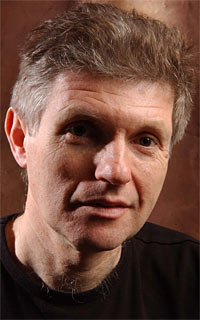UC Berkeley Press Release
Jorge Liderman, award-winning composer and music professor, dies at age 50
BERKELEY – Jorge Mario Liderman, a distinguished composer and a University of California, Berkeley, music professor, died suddenly Sunday (Feb. 3). He was 50.
 Jorge Liderman |
Born in Buenos Aires on Nov. 16, 1957, Liderman began his formal musical studies at the Rubin Academy of Music in Jerusalem, under the direction of Mark Kopitman, one of Israel's foremost contemporary composers. Liderman graduated with honors from the academy and earned his masters and Ph.D. degrees in composition from the University in Chicago in 1986 and 1988 respectively.
Liderman taught at Chicago's American Conservatory of Music for a year before joining UC Berkeley's Music Department faculty in 1989 to teach composition and music theory.
"He loved to teach the craft of composing," said Bonnie Wade, department chair, describing Liderman as a superb craftsman who took a very hands-on yet intellectual approach to teaching composition.
He attracted numerous graduate students to UC Berkeley from Latin America and Mexico, Wade said, and his connections to musicians and conductors in those regions as well as in Spain provided a complement to the department's lively French-Italian connections.
Liderman's compositions have been commissioned and performed with increasing frequency around the world by such major ensembles as the American Composers Orchestra, Los Angeles Philharmonic, London Sinfonietta, Cuarteto Latinoamericano, Boston Musica Viva, Milan Divertimento Ensemble, Radio France and by individual artists such as Diego Masson, David Tanenbaum, Oliver Knussen and Esa-Pekka Salonen. Liderman's music has been featured at festivals such as Tanglewood, Expo '90 in Osaka and London's Viva.
San Francisco's New Century Chamber Orchestra performed the world premiere of Liderman's "Rolling Springs" in March, and UC Berkeley's Cal Performances celebrated his 50th birthday in November with a concert dedicated to his chamber and vocal music.
The world premiere of his chamber concerto, "Furthermore," written for violinist Carla Kihlstedt and the San Francisco Contemporary Music Players, took place on Monday (Feb. 4) at the Yerba Buena Center for the Arts in San Francisco.
"He had a particularly musical language that people could access, but he wasn't by any means playing down to the masses," said Robert Cole, director of Cal Performances, who called Liderman "a very, very gifted composer."
Liderman's music was quite personal and lyrical, Wade said.
He worked with Chana and Ariel Bloch following their lyrical, English translation of "The Song of Songs," a famous love poem in the Hebrew Bible. He composed an hour-long, three-part cantata for the San Francisco Contemporary Music Players and the UC Berkeley Chamber Chorus that premiered in 2002 at Cal Performances.
"The passionate intensity of the Blochs' translation, its richly sonorous language and strong supple rhythms, clearly invited a musical setting," Liderman wrote in "The Song of Songs" program. He said he was struck "by the joy, warmth and color of the Song - the passion of young love, the exhilaration of a first sexual encounter, the blossoms, spices and bird songs of springtime. These impressions translated themselves almost immediately into sound ..."
Liderman won awards from the Guggenheim, Fromm Music, Harper and Gaudeamus foundations, as well as from the University of California President's Fellowship and the American Academy of Arts and Letters.
His first opera, "Antigona Furiosa," a setting of playwright Griselda Gambaro's surrealistic version of Sophocles' "Antigona," won the 1992 International Music Theater Prize at the Third Munich Biennale, and Liderman's chamber piece, "Yzkor," won the Argentine Tribune of Composers' Prize.
In a 2005 interview with the Berkeleyan, a newspaper for UC Berkeley faculty and staff, Liderman compared composing to an act of devotion or prayer, and a way of entering a deeper spiritual realm. He lamented that contemporary music has become divorced from its audience, thanks to "a ghetto of composers writing music for other composers."
Liderman said in the interview that he sought "to write music that is visceral, that can move you not just intellectually, but also emotionally and physically. I think something has to grab you on a subconscious level in the music. In my case, it's usually the music's rhythm."
"Jorge was a wonderful, kind and loving man, a brilliant composer and musician," said Liderman's wife, Mimi Wolff. "He had an extraordinary talent for expressing himself through his music. He will be deeply missed, and we know that his legacy lives on in his music and the many people he touched with his talent and generosity."
"Our department has suffered the loss of a valued colleague and friend. Jorge taught and inspired many students over the years," said Liderman's colleague, Edmund Campion, a UC Berkeley music professor and co-director of the campus's Center for New Music and Audio Technologies. He called Liderman "a gentle soul and full of love, a person dedicated to music and music composition."
Survivors include his wife, Mimi Wolff, of Richmond, Calif.; and, in Buenos Aires, his mother, Sarah Liderman, and sister, Claudia
Plans for a campus memorial are pending.

